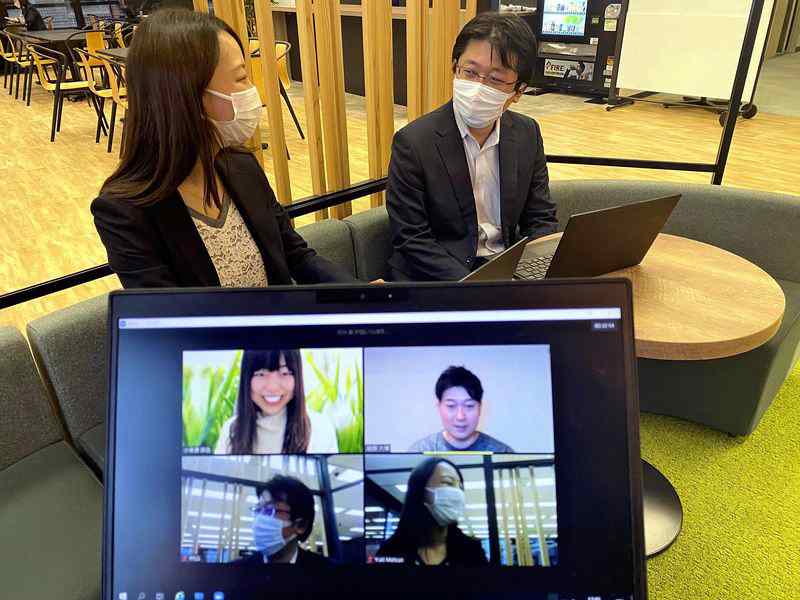
Workers at Tokio Marine Holdings Inc. often hold meetings that involve both in-office and remote workers.
10:57 JST, February 20, 2022
Flexible working is expected to be a major focus of this year’s spring negotiations between labor and management. Labor unions are demanding that companies support remote working, and address such issues as balancing work life with caring for children and other family members. Approaches are needed that can motivate workers and improve productivity, while taking individual circumstances into account.
Remote until 3rd grade
The Japanese Electrical Electronic & Information Union, a confederation of unions at electronics manufacturers and other firms, is calling on members to discuss the creation of better working environments through remote working during talks between labor and management, known as shunto.
One theme of the negotiations will be the establishment of systems to discern whether employees are stressed. Remote working has become more common during the coronavirus pandemic, but in a survey last summer of about 10,000 union members, among respondents who said they work remotely almost every day, 46.3 percent of men and 47.2 percent of women expressed anxiety about not being able to communicate.
A union official said: “Remote work provides a flexible way to work and improves work efficiency, but circumstances are different at each company. Remote work should be introduced or reviewed so it aligns with workplace situations.”
On the introduction of remote work, the Japanese Trade Union Confederation, known as Rengo, wants companies to define workplace rules pertaining to eligibility for remote work and changes in working conditions. Rengo is urging companies not to engage in discriminatory treatment against non-regular workers, such as not allowing them to work remotely for no good reason.
The confederation is also calling for clarity on who will pay the costs associated with remote working. Rengo desires that companies pay for such things as personal computers, antivirus software and internet connections.
Foreign workers
UA Zensen, a confederation of unions drawn from retail, textile and other industries, wants programs that allow shorter hours for workers with children to be expanded up to the third grade of elementary school. Under the law on child and family care leave, workers raising children younger than 3 can take advantage of this.
Improving the working environments of foreign workers is being included in the negotiations for the first time. UA Zensen is calling for inspections to check for discriminatory treatment in employment rules and for rules to be translated into multiple languages. With an increasing number of foreign workers — mainly in the dining and retail industries — there is growing international interest in human rights issues.
Residency
Some companies are already moving toward the implementation of flexible working styles. In April, Yahoo Japan Corp. plans to remove restrictions on where employees can live, allowing them to reside anywhere in the country. Workers will be allowed to commute by airplane, express train and express bus — modes of transport that are presently prohibited.
Mercari Inc. and other companies are also introducing systems that will allow employees to choose where they can live. NTT Communications Corp. plans to gradually reduce the number of group employees who are transferred, either with or without their families. The company also plans to make remote work its basic style of working.
According to the Japan Productivity Center, Japan’s labor productivity per hour in 2020 was $49.50, making it 23rd among the 38 members of the Organization for Economic Cooperation and Development (OECD). This figure represents Japan’s lowest position since 1970, since when comparable data has been available — Japan has been last among the Group of Seven countries for 51 straight years.
For companies to grow, it is essential that they create environments in which a diverse array of workers can thrive, including women, the elderly and foreigners. “It’s important to create systems that are acceptable to each individual employee,” said Yasuko Oshima, senior researcher at Recruit Works Institute. “But it’s not enough just to introduce such systems. We need to think about how they’ll actually be used.”
"Society" POPULAR ARTICLE
-

Tokyo Zoo Wolf Believed to Have Used Vegetation Growing on Wall to Climb, Escape; Animal Living Happily after Recapture
-

JAL, ANA Cancel Flights During 3-day Holiday Weekend due to Blizzard
-

Snow Expected in Tokyo, Neighboring Prefectures from Jan. 2 Afternoon to Jan. 3; 5-Centimeter Snow Fall Expected in Hakone, Tama, and Chichibu Areas
-

Tokyo, Yokohama Observe First Snowfall of Season; 1 Day Earlier than Average Year
-

M6.2 Earthquake Hits Japan’s Tottori, Shimane Prefectures; No Tsunami Threat (Update 4)
JN ACCESS RANKING
-

Japan Govt Adopts Measures to Curb Mega Solar Power Plant Projects Amid Environmental Concerns
-

Core Inflation in Tokyo Slows in December but Stays above BOJ Target
-

Major Japan Firms’ Average Winter Bonus Tops ¥1 Mil.
-

Tokyo Zoo Wolf Believed to Have Used Vegetation Growing on Wall to Climb, Escape; Animal Living Happily after Recapture
-

JAL, ANA Cancel Flights During 3-day Holiday Weekend due to Blizzard
























